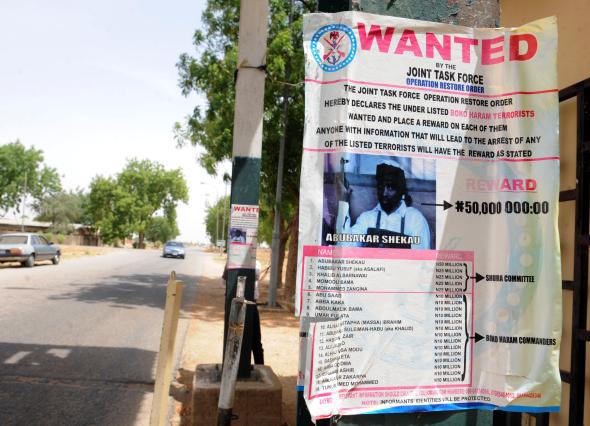In a video distributed yesterday, which also showed dozens of abducted young women chanting verses from the Quran, Boko Haram leader Abubakar Shekau said he would be willing to trade his prisoners for imprisoned members of his group.
The video is good news—the best indication the world has had that the 200 students abducted nearly a month ago are still alive—but it also presents President Goodluck Jonathan’s government with the thorny dilemma of whether to open negotiations with the group.
The best outcome would be for government forces—now working with military assistance from the U.S. and other countries—to rescue the girls. But these operations don’t have a great track record of getting the prisoners back alive. In 2012, for instance, when the Nigerian military aided by British special operations forces attempted to rescue a Briton and Italian being held hostage by Boko Haram, both were killed by their captors before they could be rescued. A rescue operation in the case carries the very real risk that not all of the girls will survive. On the other hand, a French family of seven kidnapped by the group in Cameroon in 2013 was released unharmed after a $3 million ransom was paid by unknown parties.
But negotiating with the group after a crime this dramatic sets a very bad precedent and could encourage more acts like this in the future. Taking a cynical political view, it would also make Jonathan’s government look extremely weak at a time when it’s already under intense domestic and international scrutiny for having failed to prevent the kidnapping.
The line out of Abuja right now is that negotiations are off the table. “The Federal Government is not going to engage in any form of selling human beings,” says presidential spokesman Reuben Abati. “The federal government would never negotiate with terrorists of which Shekau is one, under whatever circumstance,” says Nigerian Senate President David Mark.
“We don’t negotiate with terrorists” is a line that governments constantly trot out, often when they’re engaged in doing just that. In a 2007 essay for Foreign Affairs, counterterrorism analyst Peter Neumann provided some examples:
The British government maintained a secret back channel to the Irish Republican Army even after the IRA had launched a mortar attack on 10 Downing Street that nearly eliminated the entire British cabinet in 1991. In 1988, the Spanish government sat down with the separatist group Basque Homeland and Freedom (known by its Basque acronym ETA) only six months after the group had killed 21 shoppers in a supermarket bombing. Even the government of Israel – which is not known to be soft on terrorism – has strayed from the supposed ban: in 1993, it secretly negotiated the Oslo accords even though the Palestine Liberation Organization (PLO) continued its terrorist campaign and refused to recognize Israel’s right to exist.
This topic has recently been in the news in Israel as well, with lawmakers advancing a bill to prevent the release of convicted murderers—a measure that could make it harder to reach future deals with the Palestinians involving prisoner swaps.
As Neumann notes, some experts have argued that the decision to negotiate with terrorists should be made on the basis of whether the group has rational political aims. But this is a tricky distinction to make, particularly in the case of a group like Boko Haram.
On the one hand, the group has some characteristics of a millenarian cult—its leaders want to impose Shariah law over the entire country and reject “Western” notions such as the Earth being round or rain being linked to evaporation. But while the group may not be “rational” in its aims, it has also drawn strength and membership from some very real grievances among people in the areas where it operates.
In reality, negotiations by governments with al-Qaida-linked terrorist groups likely happen far more than those governments discuss publicly. Al-Qaida in the Islamic Maghreb, the North African affiliate of the global terror network, has earned millions of dollars by kidnapping foreigners in recent years. African and Arab governments have pushed for an international ransom ban to prevent these payments, but in the short term, many governments—particularly those in Europe—have considered ransoms a price worth paying for the return of their citizens.
The Nigerian government might, in truth, be willing to negotiate—it has held talks with the group in the past—but it’s also possible that the global publicity surrounding this case might make it more difficult to do this discreetly.
Shekau didn’t make it clear in the video exactly what his terms are and how many prisoner releases he might demand, but at the moment it’s very clear that he’s the one holding all the cards. His price will certainly be high.
At this point, Jonathan is likely searching for the least bad among some pretty terrible options.
